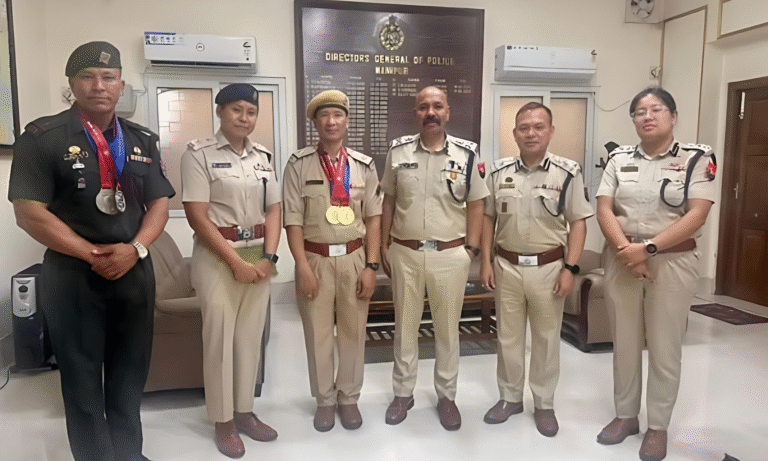Manipur: 35 Acres of Illegal Poppy Cultivation Destroyed in Lhungjang Village
In a joint effort to combat drug-related activities, a team comprising Kangpokpi Police, 133 Bn CRPF, the Forest Department, and an Executive Magistrate successfully destroyed 35 acres of illegal poppy cultivation in Lhungjang village under Saikul Police Station, Manipur. The operation is part of the state’s “War on Drugs” campaign led by Chief Minister N. Biren Singh, who emphasized the importance of collective action against such unlawful practices. This operation not only signifies the authorities’ commitment to tackling the drug menace but also highlights the pressing need for a comprehensive approach to eradicate illegal poppy farming in the state.
The Growing Menace of Illegal Poppy Cultivation in Manipur: A 2000+ Word Analysis
When you think about Manipur, you probably picture lush green hills, vibrant cultures, and a serene environment. But beneath its natural beauty lies a persistent issue that has troubled the state for decades—illegal poppy cultivation. The recent destruction of 35 acres of poppy fields in Lhungjang village is just one chapter in a long and complicated story. Let’s explore the bigger picture, the challenges, and what it will take to end this once and for all.
What Is Poppy Cultivation and Why Is It a Problem?
Before diving into the specifics, let’s get one thing straight—why is poppy cultivation such a big deal? The poppy plant (Papaver somniferum) is the raw material for opium, which can be processed into narcotics like heroin. While poppy cultivation is permitted under strict regulations for medicinal use, the illegal kind is a major driver of the global drug trade.
In Manipur, the profits from illegal poppy farming are often funneled into organized crime and insurgent activities, making it a dual threat—not just to public health but also to regional stability.
Why Manipur? The State’s Role in India’s Drug Problem
Manipur’s geographical position and socio-economic challenges make it particularly vulnerable to illegal poppy cultivation. Here’s why:
- Proximity to the Golden Triangle: Manipur is located near the infamous Golden Triangle (Myanmar, Laos, and Thailand), one of the world’s largest drug-producing regions. The porous border with Myanmar facilitates the easy smuggling of narcotics and contraband.
- Difficult Terrain: Remote villages nestled in the hills of Manipur are hard to monitor, making them ideal locations for poppy farming.
- Economic Challenges: Many farmers in Manipur live in poverty, with limited access to alternative livelihoods. The high profitability of poppy farming often outweighs the legal risks.
Inside the Recent Operation in Lhungjang Village
The recent operation in Lhungjang village stands out as a significant win in the ongoing battle against drugs in Manipur. The authorities worked together seamlessly, which is a testament to their commitment and coordination.
The key highlights of the operation include:
- A joint effort by the police, CRPF, and forest officials, showcasing inter-agency collaboration.
- The destruction of 35 acres of poppy fields, which is no small feat considering the tough terrains of Manipur’s hill districts.
- Leadership from Chief Minister N. Biren Singh, who has been at the forefront of the “War on Drugs” initiative.
But this is far from an isolated incident. Let’s take a look at other recent crackdowns to understand the scale of the problem.
Other Recent Operations: A Pattern of Success
Manipur’s authorities have ramped up their efforts against illegal poppy cultivation in recent years. Here are a few notable examples:
- Kangpokpi District (December 2024)
A three-day operation in Kangpokpi led to the destruction of 63 acres of poppy fields. This was followed by an FIR and investigations to identify those behind the illicit farming. - Ukhrul District (December 2024)
In another major crackdown, 45 acres of poppy plantations were wiped out. The operation also resulted in the arrest of two individuals suspected of being involved in the trade. - Churachandpur District (2023)
This district saw the destruction of over 100 acres of poppy fields over the course of multiple operations, highlighting the widespread nature of the problem.
What Makes Eradication So Difficult?
Despite these successes, the fight against illegal poppy cultivation is far from over. Let’s break down the challenges:
- Lack of Alternatives
For many farmers, poppy cultivation is a lifeline. Without viable alternatives, asking them to stop is like asking someone to give up their livelihood without compensation. - Insurgency and Crime
Insurgent groups often support and protect poppy farmers, using the proceeds to fund their activities. This makes it difficult for law enforcement agencies to act without facing resistance. - Geographical Constraints
Manipur’s rugged terrain makes surveillance and operations incredibly challenging. In many cases, it’s only possible to access these plantations on foot. - Environmental Impact
The large-scale clearing of forests for poppy farming has led to environmental degradation, including soil erosion and loss of biodiversity.
The Role of Community Engagement
You know what they say—“It takes a village.” This couldn’t be truer for Manipur’s fight against illegal poppy farming. Engaging local communities can be a game-changer. Here’s how:
- Awareness Campaigns: Educating villagers about the legal and environmental consequences of poppy cultivation can go a long way.
- Alternative Crops: Introducing high-value crops like ginger, turmeric, or medicinal herbs can provide farmers with sustainable income.
- Trust Building: Building trust between law enforcement and local communities can encourage villagers to report illegal activities without fear of retribution.
Technology: The Secret Weapon
Technology can be a game-changer in the fight against illegal poppy cultivation. Satellite imagery, drones, and Geographic Information Systems (GIS) can help identify and monitor poppy fields in remote areas. This not only makes operations more efficient but also helps authorities stay one step ahead of those engaged in illegal farming.
The Government’s War on Drugs: Is It Working?
Chief Minister N. Biren Singh’s “War on Drugs” campaign has been at the forefront of Manipur’s anti-drug efforts. The campaign has seen:
- Increased inter-agency cooperation.
- Stricter border controls to curb the smuggling of drugs and contraband.
- A renewed focus on rehabilitation programs for drug users.
While progress has been made, there’s still a long way to go. The success of this campaign hinges on sustained efforts, adequate funding, and community involvement.
The Environmental Angle: A Silent Crisis
Let’s not forget the environmental cost of illegal poppy cultivation. Clearing forests to make way for poppy fields has led to deforestation and loss of biodiversity. Additionally, the use of fertilizers and chemicals contaminates water sources, affecting both humans and wildlife. Addressing this issue requires a balanced approach that considers both environmental conservation and economic development.
A Path Forward: What Needs to Be Done
So, what’s the solution? Here are a few steps that could help:
- Empower Farmers
Provide financial incentives and training for alternative livelihoods. - Strengthen Law Enforcement
Equip agencies with better resources, including technology and manpower. - Boost International Cooperation
Work with Myanmar and other neighboring countries to address cross-border smuggling. - Focus on Rehabilitation
Offer support programs for individuals involved in drug production and trade to help them reintegrate into society.
Conclusion: A Fight Worth Fighting
The destruction of 35 acres of illegal poppy cultivation in Lhungjang village is a small but significant step in Manipur’s journey toward a drug-free future. While the road ahead is fraught with challenges, it’s also filled with opportunities. With the right mix of enforcement, community involvement, and sustainable development, Manipur can overcome this crisis and emerge stronger.
FAQs
- Why is poppy cultivation illegal in Manipur?
- Poppy is primarily used to produce opium, which fuels the illegal drug trade and contributes to organized crime and addiction.
- What challenges do authorities face in eradicating poppy fields?
- Difficult terrain, lack of alternative livelihoods for farmers, and the involvement of insurgent groups are major hurdles.
- How does poppy cultivation affect the environment?
- It leads to deforestation, soil erosion, and contamination of water sources due to chemical use.
- What can farmers grow instead of poppy?
- High-value crops like ginger, turmeric, and medicinal herbs are viable alternatives.
- How can technology help in combating illegal poppy cultivation?
- Tools like satellite imagery, drones, and GIS can help identify and monitor plantations in remote areas.



